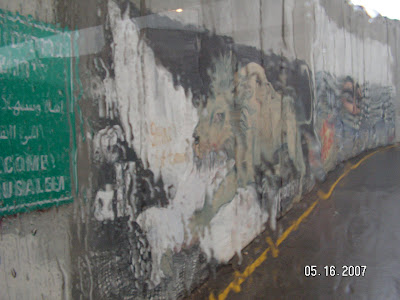

Flag-waving demonstrators filled the streets around our Jerusalem hotel. Sound trucks played lively Jewish music while young men sang and danced with their arms interlocked as they moved along the parade route. Our tour bus was returning from Bethlehem in the Palestinian Authority-controlled West Bank and the driver had to let us off a block away because streets were sealed off by soldiers and police. We walked through young Israelis celebrating the 40th anniversary of their stunning victory over invading Arab countries in 1967’s Six Day War. Men with braids growing out of their temples and wearing black hats nodded approvingly as they watched. Groups of Israeli border guards, police, and soldiers with M16s stood and watched at strategic locations on the streets, sidewalks and on surrounding rooftops.
The celebrating young Israelis were passionately patriotic and unlike anything I’d ever seen among young Americans back home. The contrast between that parade and what I had just left in Bethlehem less than five miles down the road was striking. While our bus had been inching toward the Israeli military checkpoint as we were leaving the Palestinian Authority-controlled area, I examined graffiti on the Palestinian side of the thirty-foot-tall security wall. I saw huge images which had to have been made using ladders. Raindrops from a passing thundershower blurred my view through the bus window, but I could see a huge pair of glaring eyes flanked on both sides by a keffiyeh of the pattern Yassir Arafat always wore. Next to that was a huge brown lion slaughtering a white dove. I couldn’t read the accompanying Arabic script but symbolism was unmistakable and malignant. It justified the wall. Our hotel was on the border between East and West Jerusalem and had been an Israeli bunker during the 1948 and 1967 wars. A line of soldiers with M16s faced Arab East Jerusalem as if they expected an attack, especially given that the 1967 victory being celebrated was a humiliation for Arabs.
As I stood on the sidewalk watching the parade, I thought it was a likely venue for a Palestinian Muslim suicide bomber. The dramatic graffiti I’d just seen proclaimed the hatred epidemic in young Palestinian men. I knew they were raised from childhood to blame their miserable circumstances on Israel and, increasingly, on the United States. I remembered watching film of Palestinians celebrating in the streets of the West Bank on September 11th before that film was pulled by the networks.
I also knew there were far too many Americans who see the situation as the Palestinians do, and there were others who asked themselves, “Why do they hate us?” Liberals in the United States and Europe strongly suspect the root cause of Muslim fanaticism is US and Israeli “oppression.” Not only have liberals and their leftist allies forgotten September 11th, but some like Rosie O’Donnell believe the US government itself was behind the attacks that day. I’ve been writing them off as moonbats or misguided isolationists who feel safe with oceans on either side of them. They actually believe the US can just pull out of the Middle East as we did from Vietnam and the fighting will just stop. Their numbers are growing, however, and their votes elected a Democrat majority in the US Congress last year. This de facto alliance with Palestinian fanatics is depressing.
But alas, I was even more dismayed to discover that many Israelis also blame their country for Palestinian fanaticism. These Israelis are the opposite of the ones I saw demonstrating in front of my hotel and they support the inept Israeli government of Prime Minister Ehud Olmert. An embarrassing photograph of Olmert’s Defense Minister attempting to look through binoculars with the lens caps still on was published in February. Several times he pretended to look through the lens caps at Israel military exercises in the Golan Heights, then turned his head and nodded to others behind him as if he were actually seeing something. This obvious blindness is symbolic of how Israeli liberals see their own history.
Israel has existed less than sixty years but it’s suffered large-scale attacks four times by Arab countries surrounding it like Syria, Egypt, and Jordan in 1948, 1956, 1967 and 1973. Between those wars, it has endured almost constant terrorist attacks in the form of rockets, suicide bombings and kidnappings. Twice, Israel took the Sinai from Egypt and gave it back. Egypt’s part was to recognize Israel’s right to exist. Israel pulled out of the Gaza Strip in 2005, but is rocketed every day from there. Despite all this, there are just as many naive liberals in Israel, percentage-wise, as there are in the United States. Though Israel has fought off invasions and terrorist attacks constantly in its short, 59-year history, though Israel has several times given back land it conquered from Arab countries in exchange for peace that never came, there is still a sizable block of voters there who seem prepared to do it again. Prime Minister Olmert is ready to discuss giving the Golan Heights back to Syria.
Prospects for peace in Israel are remote. Another war is likely this summer. If there will continue to even be an Israel is dependent on what group prevails - Prime Minister Olmert’s liberal moonbats or those demonstrators I saw in Jerusalem last month.


